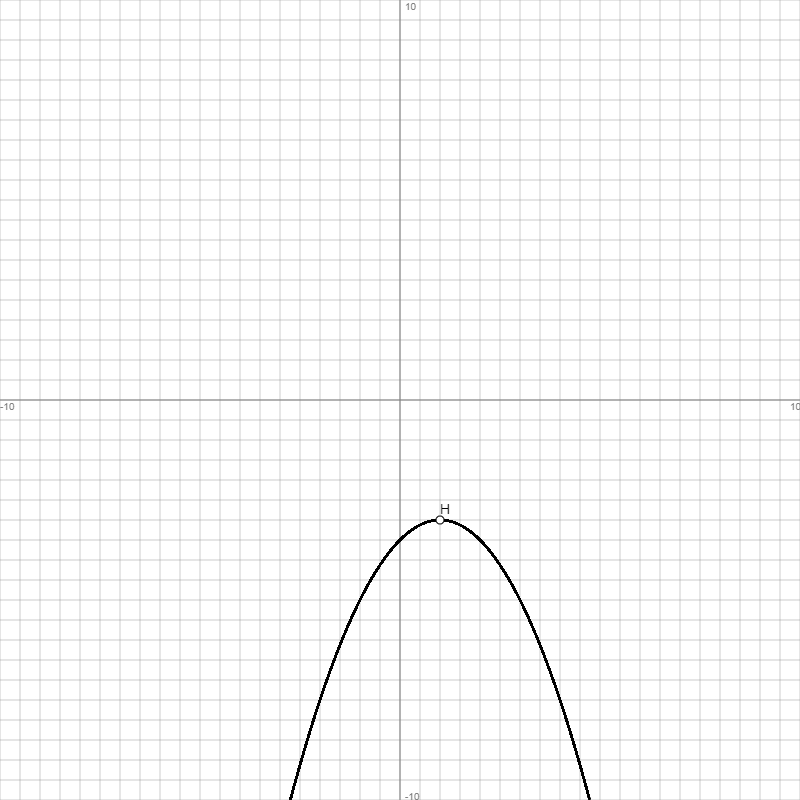
www.michael-buhlmann.de
Funktion: f(x) = -0.5·(x-1)2 - 3, Df = R, Wf = (-∞; -3], allgemeine Parabel (Scheitelform), Funktion achsensymmetrisch zur Senkrechten x = 1, x -> -∞: f(x) -> -∞, x -> +∞: f(x) -> -∞ ->
| Wertetabelle: | |||||
| x | f(x) | f'(x) | f''(x) | f'''(x) | Besondere Kurvenpunkte |
| -10 | -63.5 | 11 | -1 | 0 | |
| -9.5 | -58.125 | 10.5 | -1 | 0 | |
| -9 | -53 | 10 | -1 | 0 | |
| -8.5 | -48.125 | 9.5 | -1 | 0 | |
| -8 | -43.5 | 9 | -1 | 0 | |
| -7.5 | -39.125 | 8.5 | -1 | 0 | |
| -7 | -35 | 8 | -1 | 0 | |
| -6.5 | -31.125 | 7.5 | -1 | 0 | |
| -6 | -27.5 | 7 | -1 | 0 | |
| -5.5 | -24.125 | 6.5 | -1 | 0 | |
| -5 | -21 | 6 | -1 | 0 | |
| -4.5 | -18.125 | 5.5 | -1 | 0 | |
| -4 | -15.5 | 5 | -1 | 0 | |
| -3.5 | -13.125 | 4.5 | -1 | 0 | |
| -3 | -11 | 4 | -1 | 0 | |
| -2.5 | -9.125 | 3.5 | -1 | 0 | |
| -2 | -7.5 | 3 | -1 | 0 | |
| -1.5 | -6.125 | 2.5 | -1 | 0 | |
| -1 | -5 | 2 | -1 | 0 | |
| -0.5 | -4.125 | 1.5 | -1 | 0 | |
| 0 | -3.5 | 1 | -1 | 0 | Schnittpunkt Sy(0|-3.5) |
| 0.5 | -3.125 | 0.5 | -1 | 0 | |
| 1 | -3 | 0 | -1 | 0 | Hochpunkt H(1|-3) |
| 1.5 | -3.125 | -0.5 | -1 | 0 | |
| 2 | -3.5 | -1 | -1 | 0 | |
| 2.5 | -4.125 | -1.5 | -1 | 0 | |
| 3 | -5 | -2 | -1 | 0 | |
| 3.5 | -6.125 | -2.5 | -1 | 0 | |
| 4 | -7.5 | -3 | -1 | 0 | |
| 4.5 | -9.125 | -3.5 | -1 | 0 | |
| 5 | -11 | -4 | -1 | 0 | |
| 5.5 | -13.125 | -4.5 | -1 | 0 | |
| 6 | -15.5 | -5 | -1 | 0 | |
| 6.5 | -18.125 | -5.5 | -1 | 0 | |
| 7 | -21 | -6 | -1 | 0 | |
| 7.5 | -24.125 | -6.5 | -1 | 0 | |
| 8 | -27.5 | -7 | -1 | 0 | |
| 8.5 | -31.125 | -7.5 | -1 | 0 | |
| 9 | -35 | -8 | -1 | 0 | |
| 9.5 | -39.125 | -8.5 | -1 | 0 | |
| 10 | -43.5 | -9 | -1 | 0 | |
| Graph: | |||||
 | |||||
Abkürzungen: Df = (maximaler) Definitionsbereich, f(x) = Funktion, f'(x) = 1. Ableitung, f''(x) = 2. Ableitung, f'''(x) = 3. Ableitung, H = Hochpunkt, N = Nullstelle, P = Polstelle, R = reelle Zahlen, T = Tiefpunkt, W = Wendepunkt, WS = Sattelpunkt, Wf = Wertebereich, {.} = ein-/mehrelementige Menge, [.; .] = abgeschlossenes Intervall, (.; .) = offenes Intervall, [.; .), (.; .] = halboffenes Intervall, ∞ = unendlich.
Bearbeiter: Michael Buhlmann